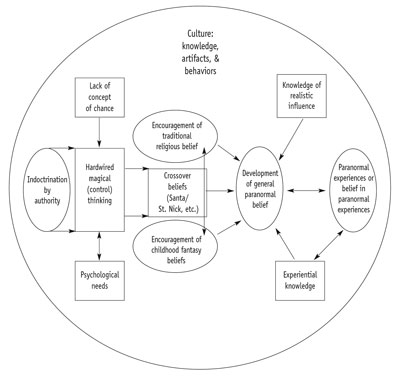Development of Beliefs in Paranormal and Supernatural Phenomena
Es gibt Leute, die auf dei Frage: "Glauben Sie, dass ein Mensch als Astralprojektion oder bei einem kurzzeitigen Verlassen seines Körpers einen Mord begehen kann?" mit ja antworten.

If we decide to mount a concerted program to disabuse the public of paranormal and pseudoscientific beliefs, we must first ask if cultures can survive without paranormal beliefs.
The media may provide fodder for pseudoscientific beliefs and create new monsters and demons for us to believe in, but each individual's culture is responsible for laying the groundwork for pseudoscientific and paranormal belief to take root. We can inform the public through dialogue in entertainment television programming about important scientific facts and concepts. We can inform the public in formal and informal science education environments, but we probably cannot greatly reduce paranormal belief without somehow fulfilling the needs currently fulfilled by it. Science educators must focus on what changes we can make and how to best make those changes. We must involve all stakeholders in the discussion of what is an appropriate level of science literacy. To paraphrase Stephen Hawking, then we shall all, science educators, scientists, and just ordinary people, be able to take part in the discussion of why it is that pseudoscientific beliefs exist. If we find the answer to that, it would be the ultimate triumph of human reason - for then we should know the mind of God.
Quelle: Sceptical Inquirer, March 2004

If we decide to mount a concerted program to disabuse the public of paranormal and pseudoscientific beliefs, we must first ask if cultures can survive without paranormal beliefs.
The media may provide fodder for pseudoscientific beliefs and create new monsters and demons for us to believe in, but each individual's culture is responsible for laying the groundwork for pseudoscientific and paranormal belief to take root. We can inform the public through dialogue in entertainment television programming about important scientific facts and concepts. We can inform the public in formal and informal science education environments, but we probably cannot greatly reduce paranormal belief without somehow fulfilling the needs currently fulfilled by it. Science educators must focus on what changes we can make and how to best make those changes. We must involve all stakeholders in the discussion of what is an appropriate level of science literacy. To paraphrase Stephen Hawking, then we shall all, science educators, scientists, and just ordinary people, be able to take part in the discussion of why it is that pseudoscientific beliefs exist. If we find the answer to that, it would be the ultimate triumph of human reason - for then we should know the mind of God.
Quelle: Sceptical Inquirer, March 2004
zeitgenossen - 22. Jul, 15:19

paßt
http://cava.twoday.net/stories/281738/
Hatte ich auch